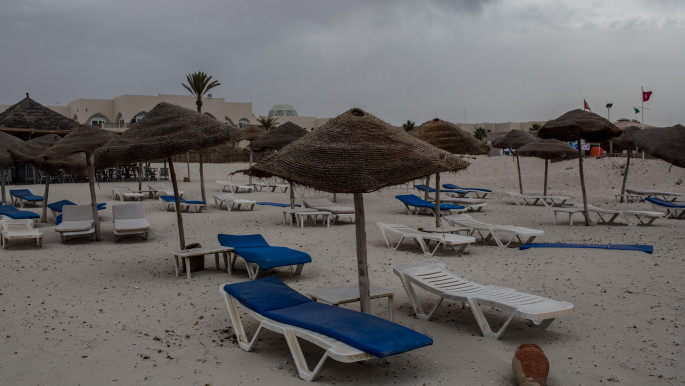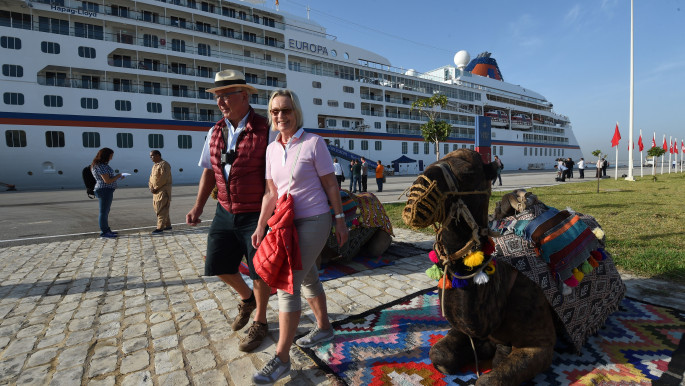Tourism beats terrorism: Holidaymakers return to Tunisia
But three years on, Tunisia's tourism trade is finally making a positive comeback with revenues up by nearly a third, signalling the start of a real recovery.
Some 2.3 million tourists visited Tunisia from January 1 through to May 20, up 21.8 percent from the same period last year, according to a document from the country's ministry. In the same period, tourist revenue climbed up to 37.7 percent, while the rate of European tourists shot up by 50 percent.
The latest data is a clear indicator of the reawakening of Tunisia's tourism sector mainly driven by the improved security situation in the country since the attacks.
In 2015, gunmen attacked the National Bardo Museum in Tunis, while militants targeted a beach resort in Sousse - targeting tourists. Both attacks saw 59 foreign tourists and a Tunisian guard killed.
 |
The first five months of the year witnessed an increase in the number of visitors, with Russians making up 57% of tourists while 46% of people were from China |  |
"Three Japanese nationals died in the Bardo museum attack, so I thought it would be still a dangerous destination for tourists," said Tayako, from Japan, carrying her newborn in a pouch on Habib Bourguiba Avenue, in the heart of the Tunisian capital.
"Then my husband told me it's safe, so here I came with my baby to visit. And I do feel safe," she continued.
Jennifer from Hong Kong agrees: "Before travelling, I felt unsafe about Tunisia. But when I came here, I found it's secure and people are friendly," she told The New Arab, while standing with a group of fellow citizens in downtown Tunis.
The first five months of the year witnessed an increase in the number of visitors, with Russians making up 57 percent of tourists while 46 percent of people were from China.
Tourism Minister Selma Elloumi optimistically called it "a real recovery," reiterating the target she projected earlier in February, with hopes of Tunisia receiving eight million visitors this year.
 |
|
| Empty beach chairs are seen in Djerba, Tunisia, a year after the 2015 terrorist attacks [Getty] |
The return of tour operators including TUI France and the UK's Thomas Cook, which pulled out after the 2015 attacks, has also helped buoy the figures.
Hotels in key tourist hotspots like Djerba, Hammamet and Mahdia are fully booked for the summer season, the tourism ministry said. Bookings of French tourists for summer holidays in Tunisia have spiked over 200 percent compared to last year, according to the Union of French Tour Operators (SETO).
Furthermore, the first three months of the year has seen a neat 100 percent rise in arrivals from the UK (10,000) and Belgium (9,600).
"People are coming back to Tunisia because there is security... we are at the same level (of security) as any European city," Elloumi added.
Security concerns have diminished, and several European countries have lifted travel restrictions, according to the Tunisian Ministry of Foreign Affairs.
Analysts believe the eased restrictions will boost Tunisia's tourism industry, which accounts for eight percent of the country's GDP.
Security has been bolstered around tourist sites such as holiday resorts, beaches and shopping centres, with thousands of police officers, soldiers and special units of the National Guard deployed in these areas. Identity checks and police search is intensified at airports and hotels, as police and hotels reportedly work more closely.
"Since the start of this year, surveillance cameras have been installed at sensitive locations across the country," explained Imed Bougouffa, director of the Yadis Ibn Khaldoun hotel in Tunis.
Filippo, a tourist, who after travelling to other parts of North Africa decided to spend his holiday in Tunisia, noticed the change.
"Security is visibly tight and authorities are treating tourists' safety seriously," Filippo said, as he walked from Tunis' Medina. "They are now better prepared to deal with a terrorist threat."
 |
Security is visibly tight and authorities are treating tourists' safety seriously... They are now better prepared to deal with a terrorist threat |  |
However, not everyone shares the same positivity.
Omar Riahi, executive director of the Tunisian Federation of Travel Agencies (FTAV) questioned Tourism Minister Selma Elloumi's eight million tourist forecast saying the figure is "inflated" because it "wrongly incorporates an estimated one million Tunisian residents abroad."
Between January and March this year, there were 200,000 Europeans landing on Tunisian soil, marking a 45 percent rise compared to 2017, but a 50 percent fall from 2010, Riahi explained, citing figures from the National office of the Tunisian Tourism (ONTT).
The French, German and Italian markets saw sharp drops of 41 percent (102,000), 55 percent (25,855) and 49 percent (18,677) respectively.
The FTAV director specified that while the country's tourism outlook is hopeful with arrivals steadily increasing, that does not bring tourist numbers back to the pre-revolution levels yet.
He also differentiated between Europeans holidaymakers staying at hotels and Maghrebi tourists, largely made up of Algerians, most of whom lodge in rented apartments and spend less.
|
||||
"While Tunisia needs to retain and develop the North African market, it also needs to revamp its traditional market, including Italy, France, Germany and UK, to help inject foreign currency into the Tunisian economy," Riahi said.
Hotel director Bougouffa added: "We can aim for seven million tourists this year... But we need to get back to the older European market. We also need to continue doing business with Eastern European countries and maintaining and developing the Algerian and Libyan markets."
The regular flux of Algerians and Libyans every year, drawn to Tunisia for either seaside or health tourism, has to some extent helped the sector during its deep crisis since 2011.
But Tunisia's efforts in improving the situation in the country cannot go unnoticed.
Riahi observed that extra security and training has been introduced.
"We at FTAV work in coordination with the ministries of tourism and interior. Training sessions are run periodically for travel agents, tourist guides, hotel agents and coach drivers," he explained. "We are also looking to equip tourist buses with a GPS tracking system."
Besides implementing strengthened security measures, Tunisia is expected to improve quality in the hospitality trade if it wants to make itself a safe and welcoming travel destination.
Both Bougouffa and Riahi highlighted the precarious state of hotel infrastructure where much refurbishment and maintenance work is needed, after a long halt in the tourist activity, in order to receive visitors again.
They shared similar thoughts with regards to service quality which has gone down in conjunction with the decline in arrivals, saying that all those concerned in the tourist sector should strive to increase the level of quality in terms of services.
All in all, Tunisia remains a target destination for European and non-European tourists. With its reasonable prices and wonderful climate, it is no surprise as to why many loved to visit this treasure of a country.
"It's inexpensive to travel to and to shop here and everyone is friendly," Tayako told The New Arab.
"The Arab and European mixed style makes it a special place. I think foreigners should come and see Tunisia," she added.
Jennifer repeated the same sentiments, adding that she will go back home and "tell my family and friends that Tunisia is definitely safe and a place they must come visit."
Alessandra Bajec is a freelance journalist currently based in Tunis.
Follow her on Twitter: @AlessandraBajec






 Follow the Middle East's top stories in English at The New Arab on Google News
Follow the Middle East's top stories in English at The New Arab on Google News


